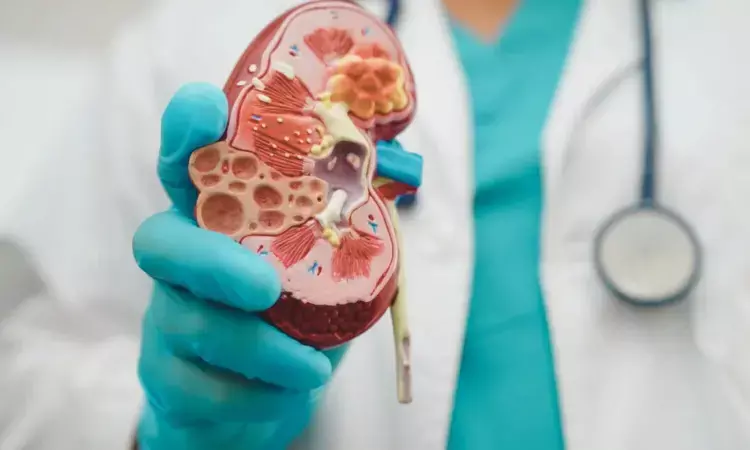- Home
- Medical news & Guidelines
- Anesthesiology
- Cardiology and CTVS
- Critical Care
- Dentistry
- Dermatology
- Diabetes and Endocrinology
- ENT
- Gastroenterology
- Medicine
- Nephrology
- Neurology
- Obstretics-Gynaecology
- Oncology
- Ophthalmology
- Orthopaedics
- Pediatrics-Neonatology
- Psychiatry
- Pulmonology
- Radiology
- Surgery
- Urology
- Laboratory Medicine
- Diet
- Nursing
- Paramedical
- Physiotherapy
- Health news
- Fact Check
- Bone Health Fact Check
- Brain Health Fact Check
- Cancer Related Fact Check
- Child Care Fact Check
- Dental and oral health fact check
- Diabetes and metabolic health fact check
- Diet and Nutrition Fact Check
- Eye and ENT Care Fact Check
- Fitness fact check
- Gut health fact check
- Heart health fact check
- Kidney health fact check
- Medical education fact check
- Men's health fact check
- Respiratory fact check
- Skin and hair care fact check
- Vaccine and Immunization fact check
- Women's health fact check
- AYUSH
- State News
- Andaman and Nicobar Islands
- Andhra Pradesh
- Arunachal Pradesh
- Assam
- Bihar
- Chandigarh
- Chattisgarh
- Dadra and Nagar Haveli
- Daman and Diu
- Delhi
- Goa
- Gujarat
- Haryana
- Himachal Pradesh
- Jammu & Kashmir
- Jharkhand
- Karnataka
- Kerala
- Ladakh
- Lakshadweep
- Madhya Pradesh
- Maharashtra
- Manipur
- Meghalaya
- Mizoram
- Nagaland
- Odisha
- Puducherry
- Punjab
- Rajasthan
- Sikkim
- Tamil Nadu
- Telangana
- Tripura
- Uttar Pradesh
- Uttrakhand
- West Bengal
- Medical Education
- Industry
N-acetylcysteine effective in reducing antimicrobials induced nephrotoxicity: Study

A new study published in the journal of BMC Nephrology showed that N-acetylcysteine (NAC) has been linked to a reduction in nephrotoxicity brought on by antibiotics.
In clinical practice, antimicrobials are frequently used to treat a variety of infectious disorders. According to the recommendations, patient survival can be increased by 7.6% with timely diagnosis (within an hour) and timely administration of effective antimicrobials. However, there is a chance that using antimicrobials might have negative side effects, such as nephrotoxicity. And, nephrotoxicity brought on by antibiotics may cause acute kidney damage (AKI), extended hospital stays, and increased medical expenses.
Numerous antibiotic classes have been shown to have the capacity to cause nephrotoxicity. These consist of beta-lactams, vancomycin, fluoroquinolones, and aminoglycosides. A commonly recommended antioxidant, N-acetylcysteine (NAC) has shown positive renoprotective effects in a number of studies.
In both clinical and experimental animal models, NAC has been shown to reduce inflammation and oxidative stress, enhance kidney function, and guard against nephrotoxic damage. The lack of randomized clinical studies makes it difficult to assess NAC's effectiveness in patients receiving antibiotics, even if it may lower the frequency of AKI in patients undergoing heart surgery and contrast delivery. This study evaluated effectiveness of NAC in avoiding nephrotoxicity caused by antibiotics.
Up to June 1, 2024, a thorough search of Pubmed, Web of Science, Embase, and the Cochrane Library was conducted to find pertinent research assessing the effects of NAC on antibiotic-induced nephrotoxicity. The inclusion and exclusion criteria were used to filter eligible records. To assess how NAC affected nephrotoxicity, the odds ratio (OR) was chosen. This study used a random effects model to pool the retrieved data.
This analysis comprised 3 randomized controlled trials. The combined findings demonstrated that NAC might lower the frequency of nephrotoxicity brought on by antibiotics. On Day 2, the NAC group's serum creatine (Scr) was much lower than that of the placebo group. Blood urea nitrogen (BUN) and creatinine clearance (CrCl) did not differ.
Overall, the outcomes of this study found NAC to reduce nephrotoxicity associated with antibiotics. Large-scale RCTs are imperative for more study in order to validate these encouraging results.
Source:
Qiu, X., Yang, S., Zhang, Y., Wang, Q., Kong, L., & Zhou, L. (2025). Effect of N-acetylcysteine on antimicrobials induced nephrotoxicity: a meta-analysis. BMC Nephrology, 26(1), 128. https://doi.org/10.1186/s12882-025-04037-y
Neuroscience Masters graduate
Jacinthlyn Sylvia, a Neuroscience Master's graduate from Chennai has worked extensively in deciphering the neurobiology of cognition and motor control in aging. She also has spread-out exposure to Neurosurgery from her Bachelor’s. She is currently involved in active Neuro-Oncology research. She is an upcoming neuroscientist with a fiery passion for writing. Her news cover at Medical Dialogues feature recent discoveries and updates from the healthcare and biomedical research fields. She can be reached at editorial@medicaldialogues.in
Dr Kamal Kant Kohli-MBBS, DTCD- a chest specialist with more than 30 years of practice and a flair for writing clinical articles, Dr Kamal Kant Kohli joined Medical Dialogues as a Chief Editor of Medical News. Besides writing articles, as an editor, he proofreads and verifies all the medical content published on Medical Dialogues including those coming from journals, studies,medical conferences,guidelines etc. Email: drkohli@medicaldialogues.in. Contact no. 011-43720751


